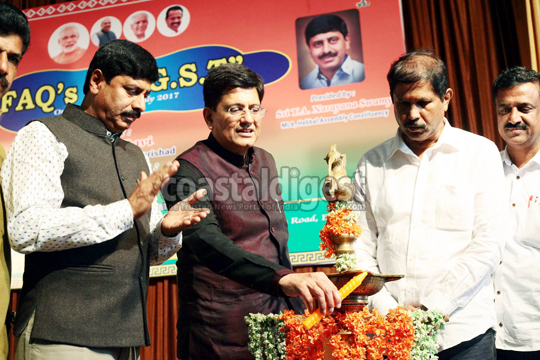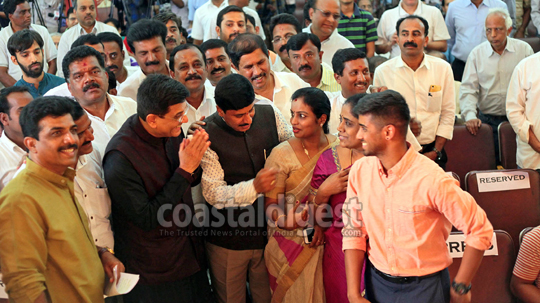Bengaluru, Jul 3: Union Minister for Energy Piyush Goyal interacted with members of the public on Sunday to clarify their doubts about the newly introduced Goods and Services Tax (GST).

The interactive session was organised by the Byatarayanapura and Hebbal mandals of Bharatiya Janata Party (BJP) at the Sri Ramana Maharshi Heritage Auditorium in Sanjay Nagar.
Addressing the gathering, Goyal said, “GST is a transformative move which will benefit the poor, farmers and the middle-class the most. The credit goes not only to the prime minister but also to the different political parties for supporting it. This is an excellent example of cooperative federalism.”
Goyal and the commissioner for Central GST, Vivek Prakash then answered questions raised by the audience.
A member of the audience asked if a digital advertising company with turnover less than Rs 20 lakh sales would be exempted from GST. Goyal confirmed that it would be, as the exemption is applicable to service providers. He further added that any company which tried to falsely show turnover below the bracket would be caught.
“In GST, there is a reverse charge mechanism. Those who availed of the services will have to pay GST and through that we can know if the service provider is trying to evade tax,” he said.
When asked why petrol and diesel were not included in GST, Goyal said that states could not reach a consensus on this matter and it could be included in the future.
Answering a question on why there were tax rates higher than 28% in some cases, the commissioner said, “In some cases, the tax rate is more than 28% because of cess. This has been included to compensate states if they have a revenue-shortfall due to GST. But this is not a permanent feature and it will be removed later on.”





 Mangaluru, Jan 16: The Akhil Bharatiya Vidyarthi Parishad is holding rallies and meetings and distributing booklets across the country in support of the Citizenship (Amendment) Act, said ABVP National Secretary Harsha Narayan here on Thursday.
Mangaluru, Jan 16: The Akhil Bharatiya Vidyarthi Parishad is holding rallies and meetings and distributing booklets across the country in support of the Citizenship (Amendment) Act, said ABVP National Secretary Harsha Narayan here on Thursday.
Comments
There are not even 200 people's even they came thinking they will get bottle to drink..God will punish them..
Add new comment